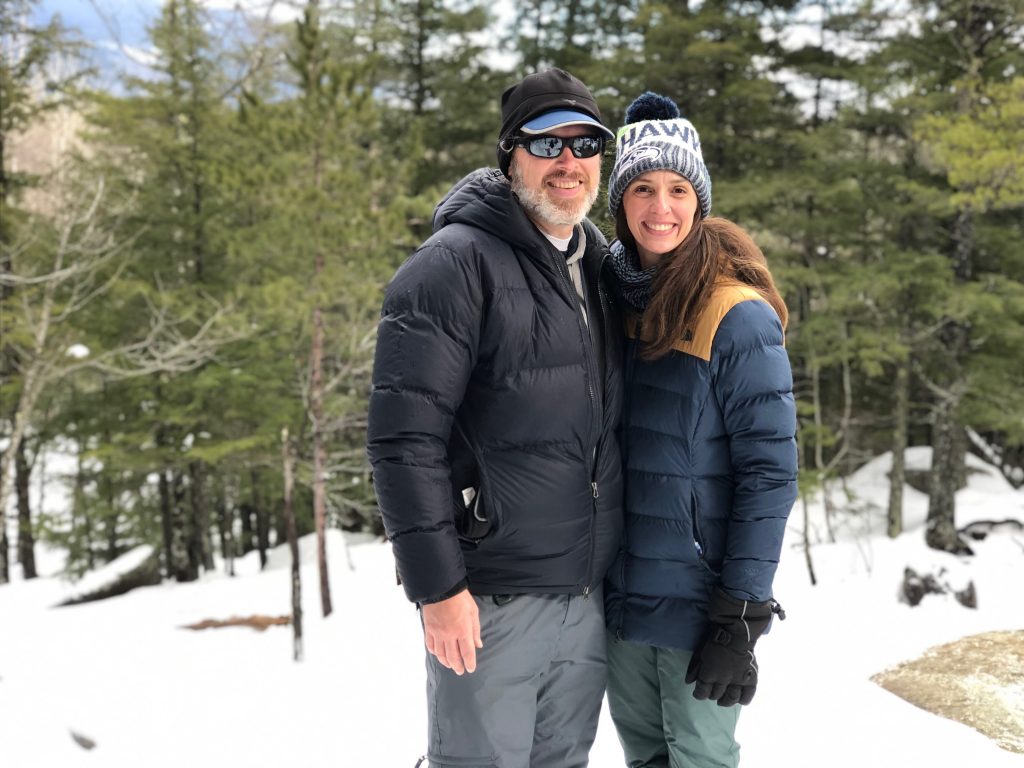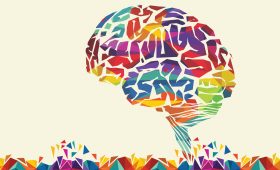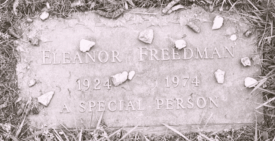
The author and her late husband (Courtesy of Clarissa Moll)
The wind whipped my hair back as I stepped out of the car to pump the gas. My husband, Rob, had died five months before, and I was hellbent on giving my kids a vacation to remember. Despite my apprehensions about a first big vacation without him, I’d packed up my four kids, our dog, and all of our winter gear for a week-long holiday in the mountains. Perhaps we could conjure up his spirit as we drowned our grief in snow.
My hands tingled in the cold as I swiped my credit card at the gas station, unscrewed my car’s gas cap and shoved in the pump. I scurried back into the car to wait, breathing a sigh as the warm air inside enveloped me. I chatted with my kids, grabbed some trash to toss. And when sufficient time had passed, I hopped out, put the pump back and drove away. I hadn’t driven five miles down the road when the gas light began to glow. Apparently, I’d never started the pump.
My gas tank wasn’t the only thing that was low on fuel. My brain was, too. I’d developed “grief brain.”
READ: My Therapist Is No Longer a Phone Call Away
Trauma affects the brain, and especially our center for critical thinking. Within minutes of receiving the news of Rob’s death, my brain had entered survival mode. Numb. Foggy. Overloaded. Like coming out of anesthesia after surgery, sometimes it was hard to figure out which way was up. My mind strained to complete normal tasks as it also attempted to begin processing my loss. Mundane activities were tiring and tasks that required problem-solving, like navigating relationships, overwhelming.
Dr. Lisa Shulman, a physician, professor of neurology, and the author of “Before and After Loss: A Neurologist’s Perspective on Loss, Grief, and Our Brain” writes, “The brain kicks into action to protect us during traumatic experience … To sustain function and survival, the brain acts as a filter sensing the threshold of emotions and memories that we can and cannot handle.”
In the early days following Rob’s death, all that was necessary was eating and drinking, resting, and caring for my children. I had no headspace for anything else.
READ: When My Husband Died, Facebook Became My Boyfriend
My brain regained capacity as the shock of Rob’s death wore off and my new life began to come into focus. I directed our household alone, coordinating the schedules of my children, managing the many responsibilities of homeownership. I went back to school and revisited my professional skills — looking for ways to make myself more marketable as the sole breadwinner for my family.
However, even as life propelled me forward, I discovered I was no longer the same person I had been before Rob’s death. More specifically, my brain was not the same. Where I once could stash a detail in my mind for safekeeping, now I had to write it down. Processes that had once been rote now needed conscious effort. When backing out of a parking space, for example, I had to remind myself to check my mirrors. My brain was shouting: “Hey, I’m hard at work here! Don’t give me anything else to do!”
I’d lost much of my mental agility, but I had gained some things, too: Grief brain taught me to defer to my brain when it signals it’s reaching maximum capacity. It taught me that my mind has limited energy and space, and I must choose carefully how to use and fill it. It taught me to spend less time planning for the future and more time focusing on what is before me now. And it has taught me to say “no” to a busy calendar and “yes” to boundaries in challenging relationships.
Grief brain is the gift of perspective.
Recently, my 12-year-old son loaded the dishwasher after dinner. “We’ve run out of detergent,” he announced after shuffling items around under the sink. I assured him I’d purchased some on my last grocery run. “Keep looking,” I instructed confidently, “I’m sure it’s there.” And as I’d expected, he pulled out the big orange and blue bag of detergent I’d remembered purchasing.
“Is this what you use for the dishwasher?” he asked with a curious smile on his face. Sure enough, I’d been washing the dishes with laundry detergent for the last couple of weeks. “I don’t think that can be good for the machine,” he muttered as he walked away shaking his head. “Guess I can’t run the dishwasher tonight!”
There was a time I would have beaten myself up about doing something so silly. A time when I’d have kicked myself for leaving the gas station without pumping the gas. No longer. Grief brain tells me, “Let it go. You’ve got more important things to think about.” That’s one thing I won’t forget.
Clarissa Moll is a young widow, the wife of author Rob Moll and the mother of four children. Having made her career storytelling for nonprofits, Clarissa now writes to companion those walking a grief journey. She blogs daily at www.clarissamoll.com Find her on Instagram at @mollclarissa.








